Local News
“Unusual in Every Way” to cap off upcoming International Jewish Film Festival
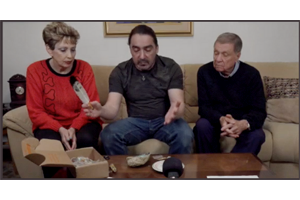
Review By BERNIE BELLAN In January of this year Myron Love wrote about a new film that has been produced by local filmmaker Yolanda Papini-Pollock, titled “Unusual in Every Way”.
As Myron noted in that article, the film tells “the story of the unlikely friendship between Don Barnard, an individual of Indigenous background living with disabilities and post traumatic stress, and Solly Dreman, a former Winnipegger who made aliyah almost 60 years ago and is a retired Ben Gurion University Professor of Psychology.”
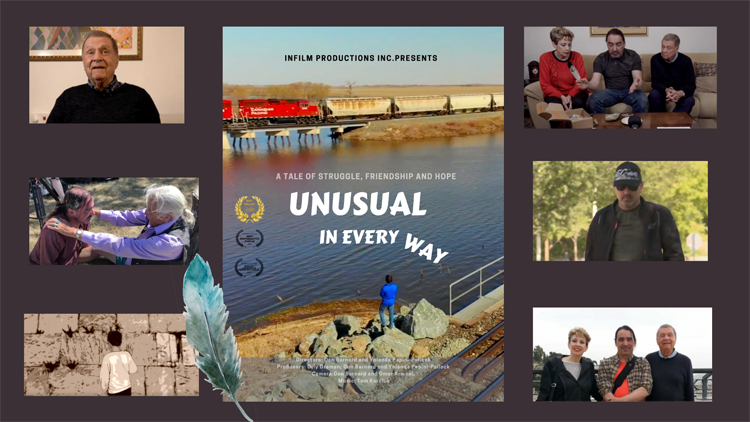 “Unusual in Every Way” will be the final film shown at the upcoming International Jewish Film Festival, on Sunday May 29, at 2:00 pm, in the Berney Theatre. (As with all the films to be shown this year, viewers will have the choice of attending in person or streaming the films on a computer or mobile device.)
“Unusual in Every Way” will be the final film shown at the upcoming International Jewish Film Festival, on Sunday May 29, at 2:00 pm, in the Berney Theatre. (As with all the films to be shown this year, viewers will have the choice of attending in person or streaming the films on a computer or mobile device.)
I had the opportunity to view the film in advance. Although I have seen other of Yolanda’s films, I told her in an email that I was more than impressed with her latest production, as it marked a new sophistication in her documentary story telling style.
Through fast cutting, clever and imaginative graphics, some outstanding historical footage interspersed throughout the film, and some very insightful interviews with a range of subjects, “Unusual in Every Way” both tells the story of Don Barnard’s personal struggles and how his own story parallels the Jewish story of survival.
Although Don has an exceedingly high IQ (of 163), he has struggled with various challenges throughout his life, as the film makes exceedingly – and quite painfully, clear. He has been diagnosed as having Autism Spectrum Disorder he reveals in the film, and his father was a violent alcoholic. (Don’s father actually appears in the film, and in one scene that can be difficult to watch, Don tells him about the often violent, alcohol-fuelled outbursts Don was forced to endure as a child. His father though, admits he has no recollection at all of any of those incidents.)
As Myron also notes in his story about the film, Yolanda first met Don when they worked together on a documentary about different genocides that have occurred in recent history. (Don is an accomplished videographer in his own right.)
Later, Yolanda introduced Don to Solly and Orly Dreman in 2016 when they were in Winnipeg for a visit. (Solly had asked Yolanda whether she knew anyone who could video a lecture Solly was going to be giving, along with a family reunion he was planning on having.)
Again, as Myron notes in his story, the “Dremans and Barnard hit it off and the Israeli couple invited him to come to Israel at their expense. It happens that among Solly Dreman’s post-retirement activities has been helping youth with severe learning disorders.
“In 2020, thanks to the Dremans’ generosity, Barnard was able to realize his long-time dream of visiting Israel. He stayed with his hosts in Jerusalem for a week and toured the country with Orly’s son, Oren Cytto, as his tour guide.
“Solly Dreman also bought his Canadian guest a professional level video camera.”
Scenes from that visit form a good part of this film. Yet, not only did Solly and Orly open up their home to Don, they also introduced him to many of their friends, many of whom had also suffered their own personal traumas, having survived the Holocaust.
As Don learns more about Israel and the experiences of many of the individuals he encounters there, he begins to become aware just how similar the Jewish and Indigenous experience is in so many respects.
After viewing the film, I was curious about many aspects of how it was put together, so I asked Yolanda some questions about how the film was produced.
I asked her, for instance, when the scenes in Israel were actually filmed – and who did the filming there?
She answered: “Most of the filming was done by Don. He was there twice (2017 and 2020) and some was done by Omer Armoni.
I told Yolanda that I was very impressed with the historical footage she assembled. For instance, there are some fascinating scenes of Native children in residential schools, also of Holocaust survivors arriving in Israel. The parallels that Yolanda draws are quite insightful, I told her.
I also said to Yolanda that this particular film “seems to be by far your most ambitious project to date. Would you agree? The amount of editing it would have required would have been enormous.”
She responded: “Thank you. I did work hard on it and it is my favorite so far because the topic is close to my heart on many levels.”
And yet, while “Unusual in Every Way” seems to be pointing to a fairly happy ending, what with Don Barnard finding so much acceptance within Solly and Orly’s family, again, as Myron notes in his story, “Papini Pollock reports that overcoming trauma is not a simple process and Barnard’s personal recovery may take a long time. Despite being inspired by the stories he heard in Israel, his personal journey to healing is a roller coaster. As he says near the end of the documentary, he has his good days and his bad days – and he never knows when his disabilities will cause him to have a meltdown.”
Yet, despite Don Barnard’s struggles, which are often laid bare for all to see during the course of this film, Yolanda told me that “Don is much better. In fact, I really see a new drive in him and he is stronger than ever. I hope this continues.”
Thus, the hope engendered by the warm relationship that the film depicts between Solly and Orly Dreman on the one hand, and Don Barnard, on the other, does seem to have imbued Don Barnard with a newfound vitality, despite the bleak shadow often cast over him. In that sense, this film can serve as an inspiration for anyone who has had to deal with similar challenges that can often seem quite overpowering.
“Unusual in Every Way”
Sunday, May 29 2:00 pm
Documentary | 2021 | Canada | Directors: Don Barnard and Yolanda Papini-Pollock| English | 63 min.
Local News
New Israeli restaurant opens in River Heights

By BERNIE BELLAN (July 6, 2025) It’s been a long time since our community has been able to welcome the opening of a restaurant that specializes in Israeli food.
That void is now going to be filled with the opening of The Green Falafel, at 1833 Grant (corner of Centennial – next to the Subway).
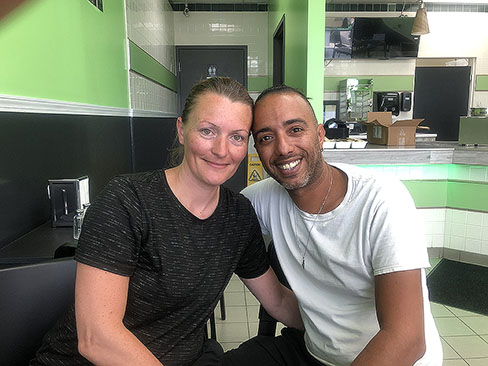
The restaurant is the fulfillment of a dream long held by the husband and wife team of Ariel and Eden Maudi, who have been living in Winnipeg the past 11 years.
Ariel, who was born in Israel and grew up in Beer Sheva, says that he worked in telecommunications in Ramat Gan for several years. He adds though that he had always dreamed of owning his own falafel stand in Israel, but life was difficult there and he decided to come to Canada as a tourist to see whether there were any opportunities here for him, Eden and their two young children.
Eden, who was born in Russia and moved to Israel with her family in 1996, stayed behind with the two kids, who were both pre-schoolers, while Ariel tested the waters in Canada first.
Ariel says he came to Canada as a tourist in 2013. His first stop was in Toronto, where he acquired his 1st class driver’s license. At the end of 2013 he moved to Winnipeg where he began working as a truck driver. Soon he found himself employed as a successful sales person at Vickar Nissan where, he says, he once achieved the status as the top car sales person in Canada. After working at Vickar Nissan for a number of years, Ariel began working as an installer for Bell MTS.
Meanwhile, Eden began working at a Walmart, later at the Costco on Regent.
But, when the opportunity to move into a space that had been previously occupied by another restaurant, but which had closed, became available, Ariel and Eden decided to open their own Israeli restaurant in an area that hadn’t seen Israeli food served since the controversial closure of Bermax Café in 2019.
The Maudis say that they will be serving a variety of Israeli dishes – all vegetarian, and that they will be fully kosher.
The “green” in Green Falafel, by the way, Ariel Maudi explains, comes from the cilantro and parsley that are added to the chickpeas. In addition, their pitas will be coming from Israel and will be baked fresh daily.
The Green Falafel will be open from 10-8 daily. Delivery will be available through Uber Eats and DoorDash.
Call 204-557-7837 for information.
Local News
Previews of shows with Jewish performers at this year’s Fringe Festival July 16-27
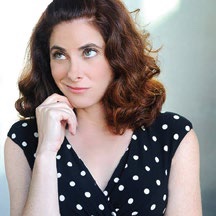
For show dates and venues go to winnipegfringe.com
By BERNIE BELLAN As has been our custom for many years now we try to find shows that have either Jewish performers or themes that would have particular appeal for Jewish audiences. Many of the Jewish performers at this year’s festival have been here before, but several are new. In no particular order here are blurbs about the shows we’ve found that fit the criteria I’ve just described. (By they way, if we’ve omitted a show that should be included in our list there’s plenty of time to get added to this post. Just drop me a line at jewishp@mymts.net.)

You’ve Been Served: A One-Woman Show About Divorce, Cults, and Coming of Age at Midlife
Noemi Zeigler
You are hereby summoned… to laugh, cry, and maybe belt out a Streisand number in solidarity. You’ve Been Served is a raw and riotous solo comedy by writer-performer Noemi Zeigler. It all begins when Noemi is served divorce papers on top of a garbage bin lid while taking out the trash—an undignified start to a full-blown midlife unraveling.
At 50, still clinging to her dream of becoming a singer, she falls under the spell of a music producer slash self-help guru, joins a spiritual cult, and, instead of landing a record deal, she lands in jail. Behind bars, with help from her long-buried inner child, she begins to reclaim her voice and her power. Turns out, dreams really do come true—just not the way she expected.
The show features vividly drawn characters—including a manipulative cult leader, a toxic ex-husband, and a jail guard named Roach who shares Noemi’s obsession with the fashion of Charlie’s Angels (the ‘70s TV version, of course.)
With salsa dancing, twerking, and a belting rendition of Don’t Rain on My Parade, Zeigler dives into abandonment, reinvention, and self-rescue. As she confronts perimenopause, she discovers it’s not the end—it’s the new puberty. The show touches on grief, sexuality, and spiritual confusion, but Noemi’s childlike optimism asks: What if your breakdown is actually your breakthrough?
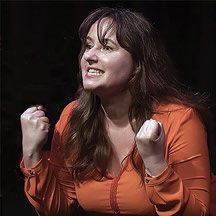
You’re good for nothing… I’ll milk the cow myself
Written & Performed by Natacha Ruck
France, 1981: The first socialist president is about to be elected and young Natacha is ready to implement her own political platform. But first, she has to take down the schoolyard bully,emasculate the rules of French grammar and make off with grandmother’s chocolate.
If you think you know the limits of Jewish mothers, evil grandmothers and transcontinental lovers, meet Natacha Ruck’s family. This true tale of three generations of women, facing three world wars, is equal parts hilarious, shocking and zany.
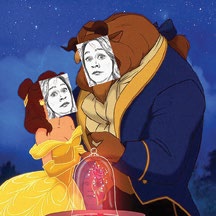
A One Human Being, Potentially Comedic Performance of Beauty and the Beast NEW WORK!
Written & Performed by Alli Perlov
Be our guest! Local high school drama teacher Alli Perlov is back for a tale as old as time. Can she sing? Not really. Can she act? That’s debatable. Will you laugh? Oh… probably.
Perlov plays dozens of characters, some human, some animal, and many objects, in a comedic exploration of Beauty and the Beast.
In an homage to this brilliant musical adventure, through witty commentary and unstoppable energy, Perlov aims to entertain an audience that isn’t forced to be there like her students.

Hockey Sticks and Beaver Pie
Written & Performed by Melanie Gall
Take a trip around Manitoba. From the 30,000 ft. St. Adolphe snow maze to the Narcisse snake dens! After all, where else holds both the title of Slurpee Capital of the World and the Guinness Record for the most people simultaneously howling like wolves?
Deanna Durbin, Terry Jacks and Burton Cummings are among the many homegrown stars, and Hockey Sticks features their music along with original songs and the stories that make this province unique.
Starring Melanie Gall from past shows Piaf & Brel, Ingenue and Toast to Prohibition
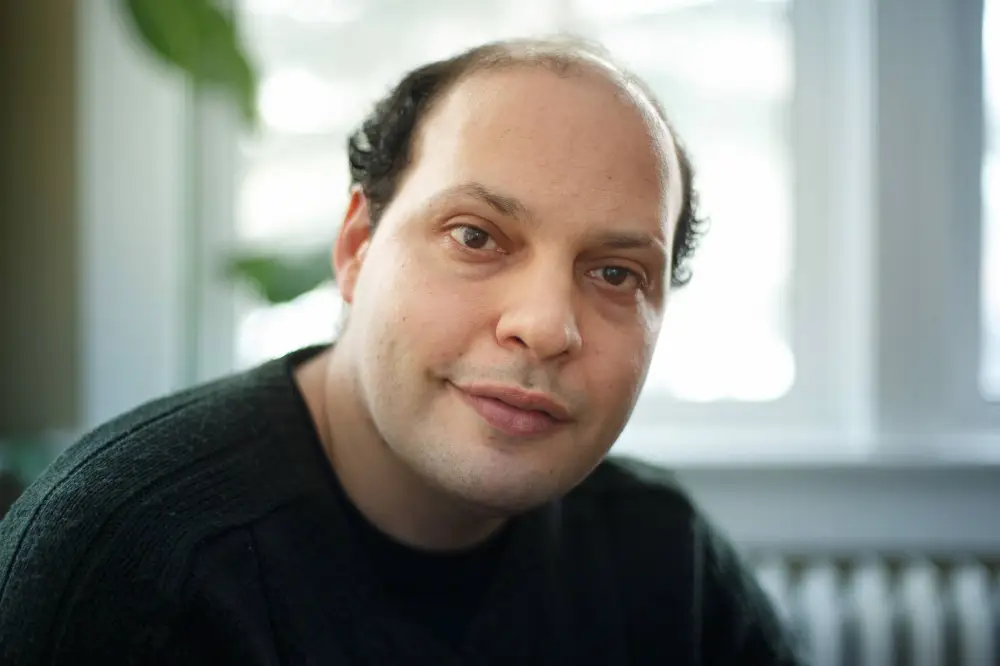
Nerohilarity Exposed
Produced by Adam Schwartz
We all sometimes feel exposed, whether that’s as a fraud or a pretender.
The performers of the award-winning Neurohilarity show, Danielle Kayahara (Laugh Out Loud CBC), Carole Cunningham (Yuk Yuks, The Debaters), Adam Schwartz (Winnipeg Fringe) and Rollin Penner (Yuk Yuks, CBC, Rumors, Winnipeg Comedy Festival), apply a comedic spin to the experiences that make us feel insecure, stripping away the emotional weight with nittygritty jokes and stories that will have you laughing uproariously.
Brilliantly awkward.
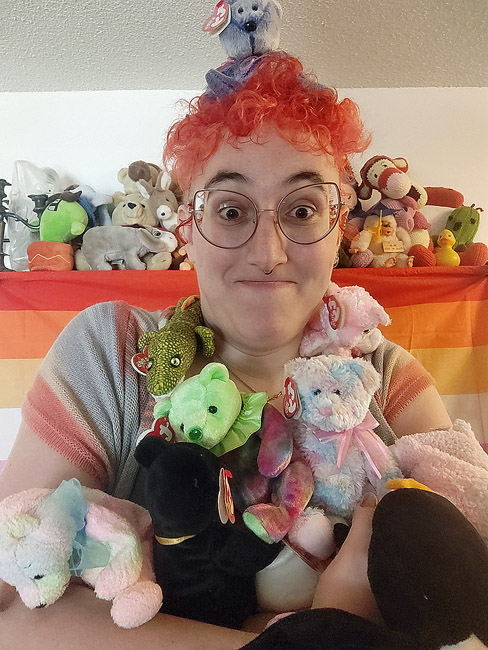
A Lesbian in the Kitchen
Willow Rosenberg
Professional lesbian Willow Rosenberg takes you on a journey through the centuries, superstitions and tablespoons of her lifelong passion for baking in this spiritual successor to 2024’s Jenny Award-nominated A Lesbian in a Bear Store.
Whether you have a favourite spatula, bake once or twice a year, or live in constant fear of being told to “just fold it in”, this one-woman show about family, joy, tradition (but make it gay),
Judaism, comfort, home (but make it gayer*), love, chemistry and magic is for you!
*Who’re we kidding, it’s all gay!

Eleanor’s Story: An American Girl in Hitler’s Germany
Written & Performed by Ingrid Garner
(Ed. note: Although Ingrid Garner isn’t Jewish, we thought the theme of this show might have a special appeal for Jewish readers.)
Based on Eleanor Ramrath Garner’s best-selling memoir, this 16x internationally award-winning adaptation – performed by her granddaughter, Ingrid Garner – details Eleanor’s youth as an American caught in Second World War Berlin.
Punctuated with humour and accompanied by cinematic sound and video, Garner embodies her ancestors in this coming-of-age odyssey, delivering an account of war that is more relevant than ever.
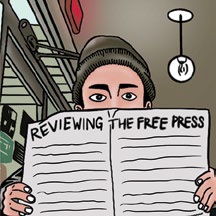
Reviewing The Free Press 2
Benji Rothman
The Winnipeg Free Press has run amok, reviewing each and every Fringe show over the past two decades without consequence or recourse. Now, it’s their turn… again.
In this refurbished work that debuted at last year’s Winnipeg Fringe, Benji Rothman once again takes the Winnipeg Free Press to task. In this (mostly) new, (hopefully) hilarious 45-minute show, Rothman dives deep into their past and exposes their faulty journalism, imbalanced reporting and, of course, embarrassing typos.
Local News
Jewish performers at this year’s Winnipeg Folk Festival July 10-13

The Black Sea Station
Long ago, there were the klezmorim, itinerant musicians who roamed the back streets of Eastern Europe, playing at parties for meals and a few coins. The sound they honed then was a visceral exploration of life’s joy, and its loss; they could whip audiences into a frenzy of dancing, or bring them to tears with the mournful wail of a clarinet. Today, Winnipeg’s own The Black Sea Station is carrying on this tradition. Featuring Daniel Koulack (bass), Victor Schultz (violin) and Myron Schultz (clarinet) — cofounders of seminal local klezmer act Finjan — along with Moldovan accordion wizard Nikolai Prisacar and multi-instrumentalist Ben Mink, the quintet transports listeners to a time and place long past. Through a mix of original songs rooted in history, and traditional tunes spun up with modern zest, they whirl through the exuberant klezmer sounds of their Eastern European heritage, tending the old ways with deep love and respect.
The Black Sea Station will be performing Sunday, July 13, at 1:00 pm in Snowberry Field.
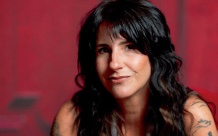
Romi Mayes
Romi Mayes has taken some hard knocks in her life, but she’s never faded away. For more than 25 years, Manitoba’s first lady of blues-rock has been a lynchpin of the Canadian roots scene. She earned that position the old-fashioned way, through her gritty, passionately emotive music. With her sizzling guitars and full-throated rasp, the Juno-nominated performer howls and purrs through razor-edged lyrics, rocking out wherever she can find a stage. She’s long been one of the hardest-working musicians on the circuit, keeping a busy slate of gigs and mentoring up-and-coming artists to get a foothold on the trails she blazed. Now, after a nine-year hiatus from the studio, Mayes has put her scintillating sound back on record with her long-awaited seventh album, Small Victories — a return that leaves no doubt, no matter the ups and downs, Mayes is here to stay.
Romi will be performing Friday, July 11, at 1:00 pm in Burr Oak.

Leonard Podolak (with Matt Gordon)
Ireland’s Matt Gordon is a fiddler and singer, whose fleet-footed clogging and thigh-slapping hambone has taken stages by storm since the 1980s. Leonard Podolak is a virtuosic master of the clawhammer banjo, who for decades has whipped up some of Manitoba’s wildest roots parties with his band, The Duhks. Put those talents together, and they can promise you this much: we’re all gonna have a real good time. Longtime friends and musical collaborators, Gordon and Podolak deliver an exhilarating trip through old-time Appalachian music. Their performances seamlessly blend intricate instrumental lines with heartfelt singing and dazzling dance. They’ve teamed up on a few records over the years, including 2020’s bigband extravaganza Power Wagon: Live At Shanley’s. But the best way to experience this duo’s toe-tapping, hand-clapping chemistry is to see it live.
Podolak and Gordon will be performing A concert with a side of clogging Sunday, July 13, at 3:00 pm in Folk School.
